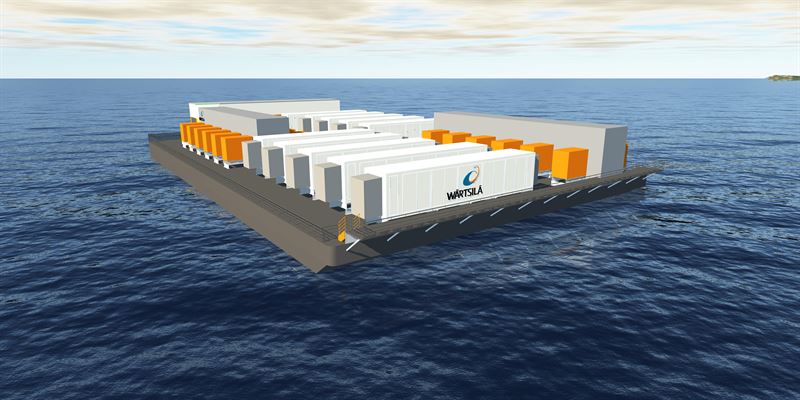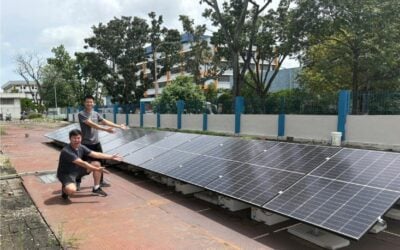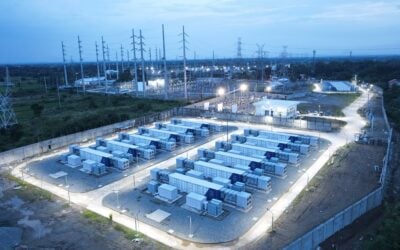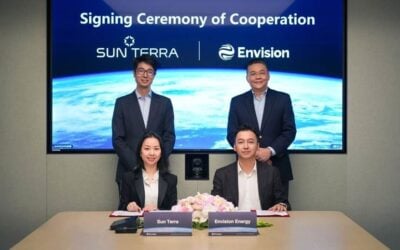
Philippines power generator, supplier and distributor AboitizPower has confirmed progress on large-scale battery energy storage system (BESS) projects which the company claimed will be part of “the foundation to sustain its long term growth”.
AboitizPower said that a 49MW BESS which will be integrated with an oil barge floating power station and a 20MW project at a hydroelectric plant site are part of a pipeline of six ongoing or recently-completed projects that form that foundation for the future. The company included the commentary in its latest quarterly Form 17-Q filed with the country’s Securities and Exchange Commission (SEC).
Enjoy 12 months of exclusive analysis
- Regular insight and analysis of the industry’s biggest developments
- In-depth interviews with the industry’s leading figures
- Annual digital subscription to the PV Tech Power journal
- Discounts on Solar Media’s portfolio of events, in-person and virtual
The other projects in that pipeline are an expansion to a coal-fired power plant, the first 200kW of capacity at a floating solar PV plant of up to 150MW, a geothermal steam well and a 74MW utility-scale solar PV project.
All of the company’s assets and activities are within the Philippines. Aboitiz Power is targeting doubling its generation capacity to 9,200MW by 2030. It said that it will commit to building a 50:50 mix of renewable and “selective” thermal baseload builds, including building one 1,000MW gas power plant within the next 10 years.
In line with government Renewable Portfolio Standard (RPS) policies, AboitizPower said it will work in line with the Philippines Department of Energy (DoE) aspirational goal of sourcing 35% of utilised energy from renewables by the end of this decade. The RPS is a market-based policy framework for mandating distribution utilities, cooperatives and retail suppliers of electricity source a portion of their energy from renewables.
AboitizPower said that it fully supports the DoE’s moratorium on building new coal power plants in the country and notes that, with its background being in hydropower and geothermal, diversified into thermal power technologies to help answer the Philippines’ need for a “reliable, accessible and affordable power supply”.
Two BESS projects will supply ancillary services
On the two BESS projects, AboitizPower said that the 49MW floating power barge project is currently 50% complete and targeted to begin commercial operations in the first half of 2022.
It will be used for ancillary services to help balance the local power networks in Maco, Compostela Valley (Davao de Oro). In March, Energy-Storage.news reported that technology provider Wärtsilä is deploying the battery system with AboitizPower subsidiary Therma Marine Inc (TMI).
TMI has a contract in place with National Grid Philippines to provide ancillary services using the existing power barge’s diesel engines, and the addition of the large-scale short-duration battery will reduce the engines’ ramping time from 15 minutes to just three.
AboitizPower said in its SEC filing on 13 August that the barge-based hybrid BESS project is one of 12 projects with a total capacity of 248MW, which the parent company is aiming to develop within the next 10 years. These projects will perform regulating and contingency applications for power supply. The TMI Hybrid BESS Project, as the company has called it, “will serve as a model for future battery investments as well as hybrid renewable energy projects,” AboitizPower said.
Its second BESS project, the 20MW SN AboitizPower-Magat BESS (SNAP BESS), located in the Municipality of Ramon, Isabela province, will also provide ancillary services. So far, “early work activities,” like site surveys and basic engineering design, have been carried out and the project is expected to go into service in the second half of 2024.
Subsidiary AboitizPower-Magat, which operates some of the company’s significant hydropower assets, is also considering upgrading a local transmission line, which has been included in a Transmission Development Plan from National Grid of the Philippines. The transmission system upgrade would assist the full dispatch of the batteries, of the Magat hydroelectric plant and enable the proposed expansion of floating solar PV capacity.
‘Beginning of a journey’ for the Philippines
Earlier this year, significant progress was reported on a 1,000MW portfolio of battery energy storage from another major Philippines power company, San Miguel Corporation (SMC) and its SMC Global Power Holdings group.
Wärtsilä and two other BESS technology providers, Fluence and ABB, announced that their projects contracted for by SMC Global Power were fully underway, with some already online and others at various stages of progress. Fluence said it brought online the first 20MW project in a 470MW / 470MWh total order, ABB said it was working on 80MW of BESS projects and Wärtsilä disclosed that it had received a 100MW / 100MWh order from SMC, of which it brought 60MW / 60MWh online by late May.
The Philippines is “only getting started” on a path to deploying significant amounts of battery storage, Wärtsilä director for the Australasia region Kari Punnonen told Energy-Storage.news in June. After a couple of years the country’s energy storage market “will develop into a full-sized market and will also be normalised as a regular business segment within the power industry,” Punnonen said.
Punnonen said that the wider Southeast Asia region holds a great deal of promise as a “really exciting” market for energy storage. That said, at a panel discussion hosted in July by our publisher Solar Media at the Solar and Storage Finance Asia event, the audience heard that while there is indeed enormous potential in the region, Southeast Asia largely lacks a regulatory environment that can enable energy storage assets to unlock their investment potential.
Alexander Lenz, APAC regional CEO for investment manager Aquila Capital said that grids in the region are less interconnected than in many other parts of the world and the share of renewable energy is growing, presenting great opportunity for energy storage to help ensure electricity system reliability and stability. However, in terms of regulations that can enable battery and other storage asset owners to earn revenues from those applications, there is still a “big question mark,” Lenz said.






